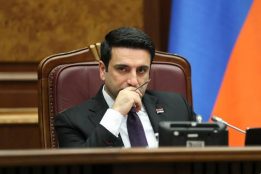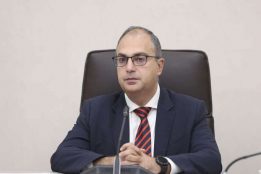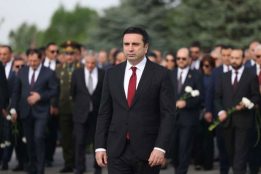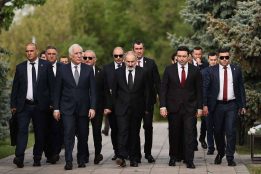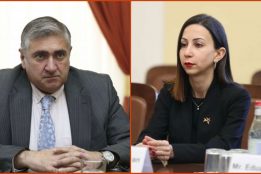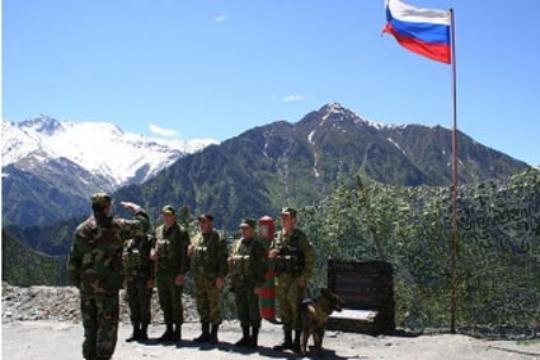
Senior associate at the Carnegie Endowment for International Peace, Thomas de Waal published a new article concerning the Russian-Georgian recent border affair. Find full text of the article below.
The Caucasus has been burning this week.
Armenia and Azerbaijan are nearer to renewed conflict. In 2004, Ramil Safarov, an Azerbaijani Army lieutenant, murdered an Armenian officer during a NATO-sponsored course in Hungary. This week, returning to Baku a convicted killer, Safarov was nonetheless pardoned and afforded a hero’s welcome, provoking an inevitable storm of fury in Armenia and an outpouring of international concern.
Meanwhile, there has been the worst upsurge of violence on the Georgian-Russian border since 2008, this time between Georgian security forces and a band of North Caucasian fighters. The fighting took place on Georgia’s eastern border with the Russian republic of Dagestan. Three Georgian servicemen and eleven of the fighters were reported killed on August 28–29 in an operation that the government in Tbilisi said was carried out to secure the freedom of a group of villagers taken hostage.
The news dominated the Georgian media for three days, eclipsing coverage of the October 1 parliamentary election.
At the same time, Dagestan itself was facing an even bigger crisis, following the assassination of Said Efendi Chirkeisky, one of its most respected Sufi clerics, by a female suicide bomber. Up to one hundred thousand people (in a population of two million in Dagestan) were reported to have turned out to attend the funeral of Said Efendi, who was trying to mediate between different Islamic factions in his republic.
The Georgian episode is dangerous for another reason, because of its obvious potential to be politicized and turned into a new pretext for Georgian-Russian confrontation.
So far that has been avoided. The main reaction in Moscow was a lack of reaction, basically a silent admission that the Georgian forces probably had indeed fought off a band of North Caucasian insurgents. That was something for which they should feel grateful, but the words “Thank you, Georgia,” could never pass their lips.
In Georgia, much of the media has been abuzz with conspiracy theories. Some commentators have speculated that this was a deliberate attempt by the Russian authorities to provoke a crisis in Georgia. That seems highly fanciful. The problem the Russian authorities have in Dagestan is that they have too little control of the region, not too much. It is unlikely that they would have been able to manipulate the movement of a group of militants high in the mountains.
It has since come to light that several of the fighters who died spoke Georgian and came from the Pankisi Gorge region, which has close historical links to Chechnya. So it is also possible that the Islamist group was trying to get into Dagestan, not out of there.
Most likely, this was a very local episode with local causes, a group of fighters crossing a mountainous border for reasons very specific to themselves. Dagestan is one of the world’s most complex multiethnic regions, home to at least fourteen main national groups. Over the last decade and a half, it has turned into a smaller version of Lebanon in the 1980s, the location of several overlapping conflicts: jihadi, interethnic, sectarian, and over power and money.
The Russian website Caucasian Knot, which closely monitors the North Caucasus, reported that 185 people had been killed and 168 wounded in political and religious violence in the first half of this year.
Objectively speaking, Russia and Georgia, the latter of which borders six out of the seven North Caucasian republics, have a strong interest in working together to contain trouble in this turbulent region.
In former times, they were collaborators. Historically, Christian Georgians were willing partners in the Russian imperial project to subdue the Muslim tribes of the North Caucasus. One of the most infamous episodes of the Caucasian wars came in 1854, when the Dagestani Islamic leader Imam Shamil sent a small army to gallop into the Georgian province of Kakheti (where this week’s incident took place) and abducted the family of the prince and imperial military commander David Chavchavadze.
More recently, of course, Russians and Georgians have signally failed to work together. Russia has accused the Georgians of at best failing to deal with the North Caucasian insurgency or at worst of aiding it—this was the source of two years of mutual recriminations about who was residing in the Pankisi Gorge region in 2000–2001. In 2004, anti-Georgian sentiment apparently trumped common sense, when the Russians vetoed the continuation of the OSCE monitoring mission that had been keeping watch over Georgia’s border with Chechnya.
Georgian policy toward the North Caucasus could be described as schizophrenic. On the one hand, there is a recognition that the region to the north is a source of instability and needs to be handled responsibly. On the other hand, there is a temptation to use it to poke the Russians in the eye and remind them how vulnerable they are (surely never a good tactic with Russia).
So the government in Tbilisi unveiled a perfectly sensible policy to grant visa-free travel for North Caucasians to Georgia, thus giving them an outlet from their claustrophobic region. But the Georgians spoiled it by springing the policy as a surprise—provoking predictable anger in Moscow. And last year, the Georgian parliament recognized the mass deportations of Circassians from the Russian empire in the mid-nineteenth century. Despite the genuine historical claims of the Circassians, it was a highly politicized and not very clever jab at Russia over a very sensitive issue.
The North Caucasus remains trapped within its seemingly endless cycle of violence and repression. It would be nice to think that the tragic events in Georgia last week could be a pretext for Tbilisi and Moscow to consider working together on its problems—especially as it remains likely that bloody episodes like the one this week in eastern Georgia will recur. But that is almost certainly too much to hope for.

















